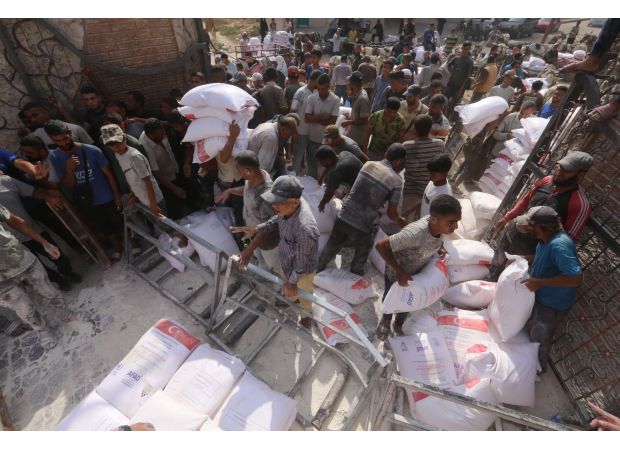Onions in Gaza are very expensive, costing more than a week's worth of wages.
The author's children go to bed hungry and they feel powerless to change the situation, causing them to cry at night.

The Turkish Disaster and Emergency Management Presidency has been working to provide aid to those in need, including distributing flour to Palestinians in Gaza. However, for 16-year-old Hala Yahya Abu Saleem and many other children in Gaza, their daily routine involves waking up at dawn to stand in long lines for basic necessities such as bread, water, and gas. Hala, who lives in a tent with eight family members, spends hours each day trying to gather enough food to sustain her family.
She explains that they often struggle to find nourishing food to help them stay healthy and strong. They must rely on canned goods, which they sometimes receive from aid organizations and other times have to purchase themselves. Occasionally, there is a brief decrease in vegetable prices, but it is short-lived. For most families in Gaza, the high cost of food is a matter of survival, as Israel's deliberate efforts to restrict access to food have led to widespread famine.
According to data from Christian Aid, the price of vegetables in northern Gaza has reached extreme levels in the past year. Onions, for example, are being sold at a staggering 400 times their pre-war price, at a cost of £82 per kilo. This is equivalent to eight times the average daily wage in Gaza before the conflict. Tomatoes, which used to cost between 0.20 and 0.40 pence, now cost £49.20 per kilo. Even basic protein sources, like eggs, have seen a dramatic increase in price, with a dozen costing £30. And while the prices of some staple foods like bread and flour have decreased since March, they are still very high, along with other items like cooking oil, which costs £10 per liter. Cucumbers, for example, now cost 60 times more than they did at the beginning of October 2023.
Many people in Gaza have reported significant weight loss due to malnutrition, with some estimating losing between 20 and 30 kilograms. This is especially concerning for families with children, as mothers like Thikrayat Al-Masuabi have had to sacrifice their own meals to ensure their children have enough to eat. She shares, "We often survive on one meal per day, if we can find one. My children cry and fall asleep hungry, and I spend nights crying because I am helpless and heart-wrenched as their tears of hunger feel like a knife cutting through me, even though I always prioritized them over myself."
Nisreen Al-Aklouk, another mother in Gaza, shared that her family has resorted to eating animal feed just to stave off hunger. This has led to her contracting several illnesses and losing 20 kilograms of weight. She says, "Prices are very high; my children see the goods available in the market, but I cannot afford to buy them. The pains of war grow within me, and the pain of their hunger is so triggering that it squeezes my heart every night."
In July, a group of independent experts described Israel's actions as an "intentional and targeted" starvation campaign against the Palestinian people. They warned that this has led to the deaths of more children due to malnutrition, stating, "Fayez Ataya, who was barely six months old, died on May 30, 2024, and 13-year-old Abdulqader Al-Serhi died on June 1, 2024, at the Al-Aqsa Hospital in Deir Al-Balah. Nine-year-old Ahmad Abu Reida died on June 3, 2024, in the tent sheltering his displaced family in Al-Mawasi, Khan Younis." They emphasized that these deaths were a result of malnutrition and lack of access to adequate healthcare.
The war that began after Hamas' attack on Israel in October 2023 has only exacerbated the food crisis in Gaza. The UN and Israeli government data shows that in September, the delivery of food and aid to Gaza reached its lowest point in seven months. Since then, the Israeli government has increased its obstruction of aid from 34% in 2023 to 83% in 2024. While Israel's military humanitarian unit, Cogat, denies blocking goods, the reality on the ground is clear: the people of Gaza are suffering.
In addition to the blockade, some merchants are also taking advantage of the situation by driving up prices and concealing goods. One consultant for Christian Aid in Gaza shared, "As well as the scarcity of products coming into Gaza and very low quantities of vegetables being grown locally, the cost of transporting goods from one area to another is very high because there is no fuel. Some merchants are also trying to play dirty games by hiding products. They are buying them at reasonable prices, keeping them in their stores and then selling them at very high prices and in limited quantities. Because there is no law or monitoring process to control the local markets, they are mainly governed by greedy merchants." The situation in Gaza is dire, and the people are in desperate need of aid and support.






